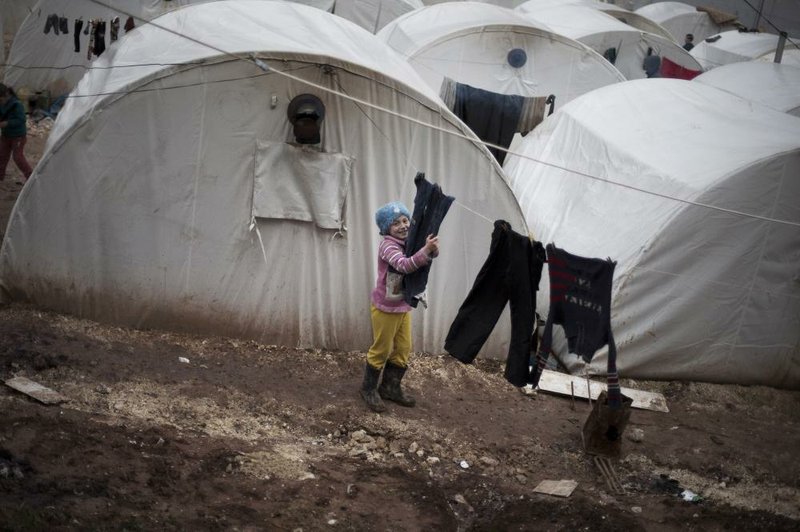BEIRUT — Gunmen from rival Sunni and Shiite Muslim villages in northern Syria have freed more than 200 people snatched in tit-for-tat kidnappings this month, easing tensions that threatened to touch off more sectarian violence, activists said Friday.
Anti-government activists in Syria said Scud missiles fired by the Syrian military slammed into at least three rebel-held districts of Aleppo, the nation’s largest city, on Friday, flattening dozens of houses, leaving at least 14 civilians dead and an undetermined number of others, perhaps dozens, buried under piles of rubble.
The wave of abductions in a rural part of Idlib province highlighted how much the civil war between the regime of President Bashar Assad and the hundreds of rebel groups seeking his ouster has enflamed tensions among Syria’s myriad religious groups.
The Syrian regime has largely stocked the upper ranks of the country’s security agencies and armed forces with members of the ruling family’s minority Alawite sect, an offshoot of Shiite Islam. Most of the rebels fighting Assad’s forces are poor, rural members of Syria’s Sunni majority. Other religious minority communities, such as Christians and Druze, have largely remained on the sidelines.
Opposition activists say the Idlib abductions began Feb. 14 when a bus carrying dozens of Shiite civilians, mostly women and children, disappeared on the road to Damascus. Gunmen from the area’s two Shiite villages, Fua and Kifarya, responded by snatching civilians from the Sunni villages nearby.
Some of the Sunnis were nabbed at makeshift checkpoints on rural roads, while others were taken while entering the provincial capital, which government troops still control. Many of the Sunnis captives, too, were woman and children.
The total number of those kidnapped remains unclear. Activist Hamza Abu al-Hassan said they included about 35 Shiites and more than 250 Sunnis. Other activists gave higher figures.
It also remains unclear who hijacked the bus carrying the Shiite civilians. Local activists said no rebels claimed responsibility, possibly because the kidnappers were criminals seeking ransom or because the move was immediately criticized by opposition groups.
Rebels threatened to storm the Shiite villages, whose residents they say have been armed by the government. But the crisis was resolved early Thursday when the Shiite captives returned home, followed by the release of the Sunni captives later in the day, activists said.
Residents of the Shiite villages could not be reached for comment, though a Facebook page for the larger of the villages, Fua, said in a post Thursday that the captives had returned.
“With God’s help, we have liberated our kidnapped sisters from hands of the enemies of God,” the post said. It also called for “retribution.”
Although the abductees have all been freed, the fundamental divide between the Sunni and Shiite villages remains.
“There will have to be a battle in the future because the army is there,” Ismael Khatib, a rebel from the village of Taftanaz, said via Skype. “They have tanks there that shell us, so it is natural that the rebels will liberate the area to stop the shelling.”
The explosions in Aleppo on Friday hit the eastern neighborhoods of Ard al-Hamra and Tariq al-Bab, the Britain-based Syrian Observatory for Human Rights said.
The assertion of the use of Scud missiles, apparently corroborated by videos posted on the Internet, came one day after Syrian government targets in central Damascus were hit by multiple car bombings that were among the most deadly and destructive so far in the nearly two-year-old conflict.
The reported attack with Scuds, which are not known for their accuracy, was the second time this week that the Syrian opposition has accused the military of using such missiles on Aleppo’s rebel-held areas.
The Observatory said at least 14 people were killed, while the Aleppo Media Center activist group put the death toll at 16.
In Cairo, the Syrian National Coalition, an opposition umbrella group, said it would welcome U.S. and Russian mediation to negotiate a peace deal to end the country’s civil war but insisted it would not allow Assad or members of his security services to participate in the talks. The announcement came in a statement posted on the coalition’s Facebook page after two days of meetings in Cairo meant to firm up the group’s position on whether to engage in talks.
Friday’s announcement appeared aimed at setting the boundaries for any future talks by stressing that Assad and his aides cannot be part of any negotiations.
The coalition also agreed to form a transitional government in rebel-held areas and said it will meet on March 2 in Turkey to choose a leader for the administration, spokesman Walid al-Bunni told reporters in Cairo.
Meanwhile, Russia and the United States are blaming each other for the failure of the U.N. Security Council to issue a statement condemning the car-bomb attack in Damascus that killed at least 53 people.
Russia accuses the U.S. of blocking a council statement condemning the rebel attacks. The U.S. said it supported the statement but wanted to add language condemning the Assad regime’s recent attacks.
The sniping between Moscow and Washington over Syria, while not new, hardly augurs well for a Feb. 26 meeting in Berlin of Russia Foreign Minister Sergey Lavrov and John Kerry, the new U.S. secretary of state.
The meeting will focus on Syria, among other matters.
The New York-based Human Rights Watch urged the U.N. on Friday to require Syrian authorities to grant international monitors access to its detention facilities, after the death of a peace activist in custody.
Omar Aziz, 64, died on Feb. 16 of health complications at a military hospital, the group said in a statement. It also described how a newly released detainee reported witnessing the death of Ayham Ghazzoul, an imprisoned 26-year-old rights activist. Both had been detained by security forces in November.
Information for this article was contributed by Zeina Karam, Ryan Lucas and Aya Batrawy of The Associated Press; and by Hwaida Saad and Rick Gladstone of The New York Times.
Front Section, Pages 6 on 02/23/2013


